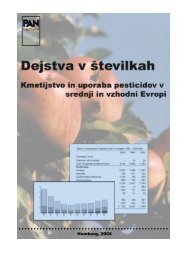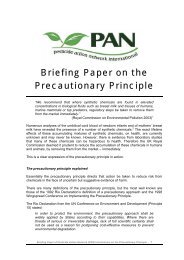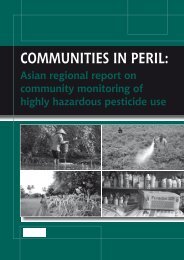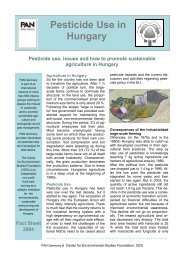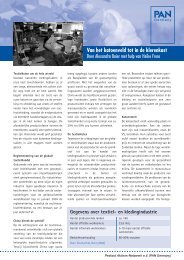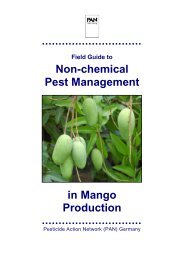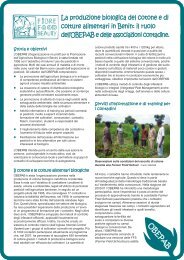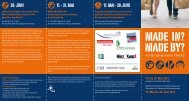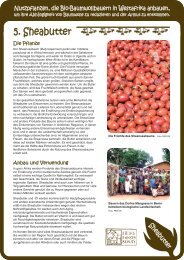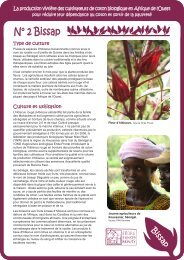Field Guide: How to Grow Crops without Paraquat - Online ...
Field Guide: How to Grow Crops without Paraquat - Online ...
Field Guide: How to Grow Crops without Paraquat - Online ...
You also want an ePaper? Increase the reach of your titles
YUMPU automatically turns print PDFs into web optimized ePapers that Google loves.
<strong>Field</strong> <strong>Guide</strong>: <strong>How</strong> <strong>to</strong> Live and Work Without <strong>Paraquat</strong><br />
Prologue<br />
Pesticides worth more than 30 billion US dollar are intentionally released in<strong>to</strong> the global<br />
environment every year. Many of these pesticides are highly <strong>to</strong>xic and have immediate<br />
adverse effects on human health, wildlife, local food sources such as cattle or fish, beneficial<br />
insects and biodiversity. Several of them have chronic effects including cancers, reproductive<br />
problems, birth defects, hormonal disruption and damage <strong>to</strong> the immune system. Impacts<br />
come from direct exposure in use, spray drift, washing work clothes used while spraying,<br />
home pesticide s<strong>to</strong>rage, pesticide dumps, and persistence in the environment. One of these<br />
highly problematic pesticides is paraquat.<br />
<strong>Paraquat</strong> is one of the most widely used chemical herbicides. It is a quick acting compound<br />
used <strong>to</strong> control broad-leaved weeds and grasses. It is also used as a defoliant for cot<strong>to</strong>n and<br />
hops (before harvest) and as a desiccant for pineapples, sugarcane, soybeans, and sunflower<br />
(after harvest). Trade names of paraquat formulations are Gramoxone, Herbaxon,<br />
Cyclone, Total, Weedless, Goldquat, among other 20 or so brand names. It is also available<br />
as <strong>Paraquat</strong> + Diquat and <strong>Paraquat</strong> + Urea herbicides.<br />
<strong>Paraquat</strong> is acutely <strong>to</strong>xic and has serious and irreversible effects if absorbed. Farmers and<br />
agricultural workers exposed <strong>to</strong> paraquat during mixing and spraying often experience both<br />
immediate <strong>to</strong>xic effects and long-term health problems. Short-term health effects among<br />
paraquat users include eye injury, nosebleeds, irritation and burns <strong>to</strong> the skin and other parts<br />
of the body. Other symp<strong>to</strong>ms of acute poisoning include nausea, vomiting or pains, and<br />
difficulty in breathing, and may develop with a delay of two <strong>to</strong> three days. Chronic exposure<br />
<strong>to</strong> paraquat can affect the lungs, nervous system or brain, skin and reproduction with possible<br />
birth defects. Epidemiological studies link the long-term exposure <strong>to</strong> low doses of<br />
paraquat resulting in decreases in lung capacity. <strong>Paraquat</strong> was also associated with an<br />
increased risk of developing Parkinson's disease.<br />
The continuous use of paraquat makes weeds resistant <strong>to</strong> it. Examples are Goose grass,<br />
Saramollagrass, Black nightshade, Horseweed, Pigweeds, among others. But lots of weeds<br />
are in the list which are resistant <strong>to</strong> herbicides in general. These are the weeds commonly<br />
found in agricultural lands and they lessen the crop’s yield as high as 50%.<br />
Pesticide Action Network (PAN) is working <strong>to</strong>wards reducing the overall use and risks of<br />
pesticides as well as the dependence on pesticides and <strong>to</strong> increase support for communitybased<br />
control over a sustainably produced food supply. PAN is committed, in its projects,<br />
strategies and campaigns <strong>to</strong> place pesticide concerns in the broad political and economic<br />
context in ways that will advance the fight against rural poverty and enhance pro-poor<br />
development and ethical trade.<br />
PAN aims <strong>to</strong> help local communities use initiatives <strong>to</strong> benefit their day-<strong>to</strong>-day lives. One of the<br />
various activities of PAN <strong>to</strong> de<strong>to</strong>x plant protection and pest management is <strong>to</strong> call for the global<br />
elimination of the use of paraquat and <strong>to</strong> provide information on alternatives <strong>to</strong> the use of this<br />
<strong>to</strong>xic pesticide. <strong>Paraquat</strong> is one of the PAN International "Dirty Dozen" pesticides that must be<br />
eliminated worldwide. Agricultural workers unions across the world also have been calling for a<br />
ban on paraquat for years.<br />
PAN Germany is part of the international Pesticide Action Network. Being part of this alliance<br />
PAN Germany is working on the national, European and international level and is among others<br />
•••••••••••••••••••••••••••••••••••••••••••••••••••<br />
6 Pesticide Action Network (PAN) Germany



